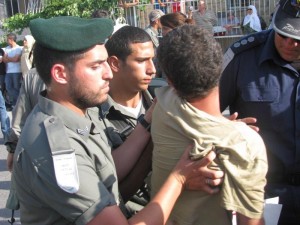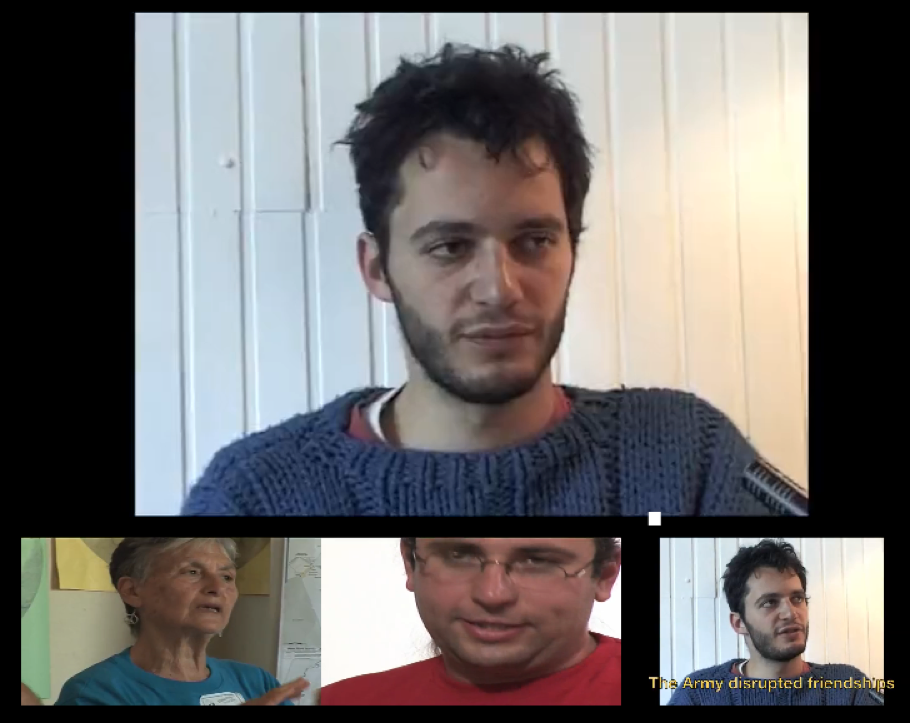The Only Democracy? » On The Ground Reports » Sheikh Jarrah, July 9, 2010
Sheikh Jarrah, July 9, 2010
By David Shulman
I’ve been thinking about truth. About what the word means, and how we know what it means. This comes in the wake of yesterday’s demonstration, with its by now habitual rituals unfolding in their remorseless, bitter order—the hopeful beginning, the drumming and slogans, the dispossessed Palestinians standing beside us as we chant, the rapid, volatile crescendo, the eventual police attack, and the arrests. Sarah, a young woman of astonishing courage and clarity, was among the first to be arrested.
On the one hand, Sheikh Jarrah is a touchstone. As Misha said to me on the way back: Some things are amazingly simple. In Sheikh Jarrah you can see pure theft in all its starkness. The Bible says “Thou shalt not steal,” and it—God, that is– was referring to Sheikh Jarrah. Any one can see it. The shocking thing, of course, is that the whole apparatus of the modern state—the municipality, its committees and master plans and grey bureaucrats, the mayor, the government, the Prime Minister, the cabinet, the courts, the police, the secret services—all these have colluded in actively perpetrating the theft. There’s really not much room for argument. Either you stand by and let them throw innocent people out of their homes, or you come each week to demonstrate and resist. It’s particularly terrible because the wave of expulsions is continuing, in fact intensifying. Two weeks ago we shifted the demonstration to the new set of houses that have been targeted. As so many times before, we heard an aged, wrinkled Palestinian grandmother say: “Why are they doing this to us? I prefer to die than to leave my home.”
It’s clear that the government wants to destroy the whole of Palestinian Sheikh Jarrah, to rid the neighborhood of its many dozens of extended families, and to replace them with Jewish settlers. It’s quite possible that in a few years’ time, if the process continues to accelerate, there will be nothing left of Sheikh Jarrah. The mosque will be replaced by a yeshiva—plans for its location already exist– the homes of the Palestinian refugees from 1948 will be occupied by fanatical settlers, new (ugly) apartment buildings will go up, the Arabic street signs will disappear; in short, a whole piece of reality, with its language, its memories, its dreams, its human dramas, large and small, will be liquidated. That’s the plan. That’s what they want. Why should they want it? Hate exists. Truth can be simple.
On the other hand, I think this simple truth is itself enveloped by another, deeper one, more inchoate and lonely, perhaps resistant to formulation. I’ll try to say something about it and about the way it becomes manifest.
The early part of the demonstration is somehow satisfying. No sooner do we arrive than Ezra Nawi spots me and recruits me to his infiltration squads: “Come with me.” I should describe the situation. The stolen houses, now inhabited by Israeli settlers, are about 100 meters down one of the main streets leading into the neighborhood. In recent months, the protestors have been strictly barred from approaching the houses, or even from setting foot in the upper part of the road. Settlers and right-wing activists have free run of the entire neighborhood, as do ultra-orthodox Jews who come to pray at the nearby tomb of Simeon the Just. Our quarrel is not with the latter. The houses themselves are now draped in Israeli flags, and on the roof of the al-Ghawi house there is also a large, crude candelabra, probably there since Chanukah.
Something changed slightly in the course of this last week. Some of our people prepared an appeal to the Legal Adviser to the government, Yehuda Weinstein; the letter sets out, in precise, understated language, the tortuous story of police violence and illegal actions in Sheikh Jarrah over the last few months, and also offers the fairly obvious explanation that senior officers in the Jerusalem police are driven by a blatant right-wing bias. The letter was signed by many well-known public figures in Israel and received much media attention. So today, riding on the crest of a wave, however small, we are no longer playing by their rules. The police barricades are up, and both the blue-grey Jerusalem police and the sinister, black-clothed riot police are there, but a good 200 to 300 activists, maybe more, are already milling around in the upper part of the street. I follow Ezra and a few others by a roundabout route, over walls and fences and through an olive grove, to end up in front of the stolen houses themselves. The drummers are drumming, and there are shouts: “Free Sheikh Jarrah!” “One Two Three Four, Fascism Will March No More!” And so on. I hug Nasir, one of the evictees. About fifty of us have gotten through, and there is a steady stream of new faces, including, to my delight, my son Misha and his bride-to-be Erika (they announced their engagement to us just half an hour before).
It is good to be here, close to the families (a really good place to celebrate an engagement). On the outer wall of the al-Kurd house, someone has etched a Palestinian flag with the caption: “History is With Us.” A small contingent of police is there to hold us back, and at first they are relaxed, almost nonchalant. Occasionally, we hear shouts and cries from the upper street; later we discover that the police had already moved to suppress the protest there with violence, and the first arrests were under way. Eventually they get to us, too. Reinforcements arrive, and soon they attack, pushing and poking us, lashing out, bending arms, kicking a little, roughing us up, and occasionally picking someone out and carrying him or her off to the detention vans. I’ve seen much worse, but it isn’t pleasant, and it is, needless to say, both illegal and gratuitous. A non-violent demonstration of this sort has repeatedly been pronounced legal by the judges who, week after week, released the arrested activists (after a weekend in jail) and reprimanded the police for making the arrests in the first place.
Herded uphill, amidst the yelling and the scuffles, we are singing the famous Hasidic song of Rabbi Nachman of Bratzlav: “The whole world is but a very narrow bridge, and the main thing is not to afraid.” Speaking of truth, it rings true on this sorrowful street, like a memory of what it once meant to be Jewish. I wonder what Rabbi Nachman, one of the deepest minds in Jewish history, would have said about what is happening in Sheikh Jarrah. Actually, I think I know. A policeman strikes Erika, and Misha instinctively moves to protect her, pushes him back. A friend asks me why we are refusing to obey the police commands, why we are moving so slowly, holding our ground, so that they have to push and drag us physically up the hill, and some people get hurt and get arrested. I explain. It is important to resist. It is basic to who we are and what we stand for. Even if no one is watching, even if no one knows, if we are to remain human, we must continue to bear witness and to resist.
Even as I say the words, I realize they’re not much of an argument. So what if we resist? Look at the forces arrayed against us, look at our failure to make change happen. Where are the hundreds of thousands who should be standing here with us? What good is truth, anyway, when the liars and the thieves and the demented politicians have the guns, and when the ordinary Israeli person, whoever he is, just living his life, won’t break through the shell of his lethal indifference? But I’m not groping toward a philosopher’s truth, and the moral equation is not, after all, in question. We’ve already defined the situation. “Thou shalt not steal.” What does this have to do with being poked and prodded up the hill?
I think the point is that there is no ordinary person. For every one there’s the same precarious balance, and the same struggle. The easy way is always to go along with the cruelty; most do. Some don’t. You can see it here on the street. Something has galvanized the people around me to do the decent thing. I don’t think they had to think about it. It is something one knows the way we know that someday we will die, though we mostly deny this in our hearts; or the way we know how to fall in love, and how to stay in love, and how to hold a baby and how to rest when we are tired and other things like that. Such knowledge isn’t simple in the way the other kind of truth might be. It is something we carry in our bodies, and it’s often a rather delicate and complicated business, where it’s easy to make the wrong choice out of fear or laziness or confusion. Hence the struggle. When you make the right choice, there’s truly no mistaking it. No syllogisms or proof-texts are needed. Your skin tells you, or your muscles and bones, even before your mind looks for words. You feel whole—a whole human being, capable of action. I look around me at the stalwarts of the Sheikh Jarrah protests. The moral calculus of action, easily put into words, is not the only reason they are here. Actually, nothing instrumental can fully explain it, any more than the instrumental or the reasonable can explain why we are alive. Let them poke me and push me and arrest me and curse me, I don’t care. I care that they have driven Nasir and his family from their home. In that sense, I’m here for truth, a Greek truth, perhaps, the peeling away of a veil. I will stand my ground.
There was another good example of it last week. Yonatan Shapira, a captain in the Air Force who has refused to serve, who helped organize the letter of the pilots refusing to perform missions in the Palestinian territories, sprayed two graffiti on the last remnant of the wall surrounding the Warsaw ghetto: “Liberate all ghettos” (in Hebrew) and “Free Gaza and Palestine” (in English). He did it openly, in the full light of day, and he also explained it:
“The Holocaust has been appropriated for years now by the Israeli government and the Israeli education system. The Israeli establishment would rather have Jews and Israelis in a state of frightened victims who worship militarism…..In our act we tried to separate between the actions of the Israeli Government and Jews. The lesson that should be learned from the Holocaust is resistance to any form of racism. Resistance to ethnic cleansing and forced expulsion of people. Resistance to the starvation of human beings and their confinement into ghettos. These are issues that the Israeli policy makers would like us to ignore and forget.”
At the top of the hill I find my colleague Tamar. “How’s the revolution going up here?” I ask her, a little sadly. “Just look at these people,” she says. “They’ve planted some strong seeds. Some day they will bear fruit.”
Filed under: On The Ground Reports · Tags: East Jerusalem, Sheikh Jarrah, Ta'ayush









 “You have a choice! Israeli Anti-Militarists Speak”
“You have a choice! Israeli Anti-Militarists Speak”